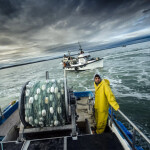Newly released plans for an expansion of domestic offshore drilling from the administration of U.S. President Donald Trump could come at a significant cost to the country’s seafood industry, according to environmental advocates and public officials.
As the Bureau of Ocean Energy Management held a public comment meeting in an Annapolis, Maryland hotel on Tuesday, 16 January, those opposed to the plan met at the same hotel.
William C. Baker, president of the Chesapeake Bay Foundation, reiterated his opposition to leasing drilling rights in Maryland waters and elsewhere. The bay is a critical nurturing ground for blue crabs.
“One oil spill at the wrong time at the wrong place could wipe out an entire year’s class of Chesapeake Bay blue crabs, several hundred million dollars worth, and all the jobs that associate with it,” Baker said at the rally, according to the Capital Gazette.
U.S. Interior Secretary Ryan Zinke unveiled the administration’s proposal, which would open nearly all the country’s coastal waters for oil and gas drilling over a five-year period. Proponents of offshore drilling say it would create new jobs and reduce the country’s reliance on foreign oil supplies.
The first public meetings to receive input into the plan were held Tuesday, 16 January in Annapolis and Jackson, Mississippi. According to the Associated Press, the Mississippi meeting drew a small crowd due to snowy conditions.
Phil Bryant, the state’s governor, released a statement earlier this week supporting the administration’s plan, citing the planned drilling would take place further offshore than in other states.
However, leaders in other states affected by the proposal have come out against the plan, and initial comments have already caused the administration to step back on parts of it. Just days after the unveiling, officials removed Florida waters from the plan after Gov. Rick Scott – a Trump supporter – said offshore drilling could negatively impact his state’s tourism economy.
On Monday, New York Gov. Andrew Cuomo set up a petition on his website urging supporters to speak out against his state’s inclusion in the plan.
“If Florida gets an exemption, then New York should too,” Cuomo said in his petition.
In addition, U.S. Senators from New England states came introduced a bill last week that would prohibit drilling off their states’ coasts and said the administration’s plan poses a threat to fishermen. https://www.blumenthal.senate.gov/newsroom/press/release/blumenthal-and-murphy-join-new-england-senate-delegation-to-introduce-new-england-offshore-drilling-ban
“The waters off Maine’s coast provide a healthy ecosystem for our state’s fisheries and support a vigorous tourism industry, both of which support thousands of jobs and generate billions of dollars in revenue for Maine each year,” said Maine’s U.S. Sens. Susan Collins, a Republican, and Angus King, an independent, in a statement. “With our environment so closely tied to the vitality of Maine’s economy, we cannot risk the health of our ocean on a shortsighted proposal that could impact Maine people for generations.”
A public meeting scheduled for Wednesday in Richmond, Virginia, was canceled due to weather conditions. The meetings will continue through 28 February. The public also can comment on the on Zinke’s proposal through 9 March, with letters accepted via an online portal and mail.
After the 60-day comment period, Zinke will release a revised proposal. A 90-day comment period will follow that release, and a final proposal will be unveiled after that. The president and Congress will have a 60-day window to review the final plan. The Interior Department hopes to have the plan finalized by the end of next year.






